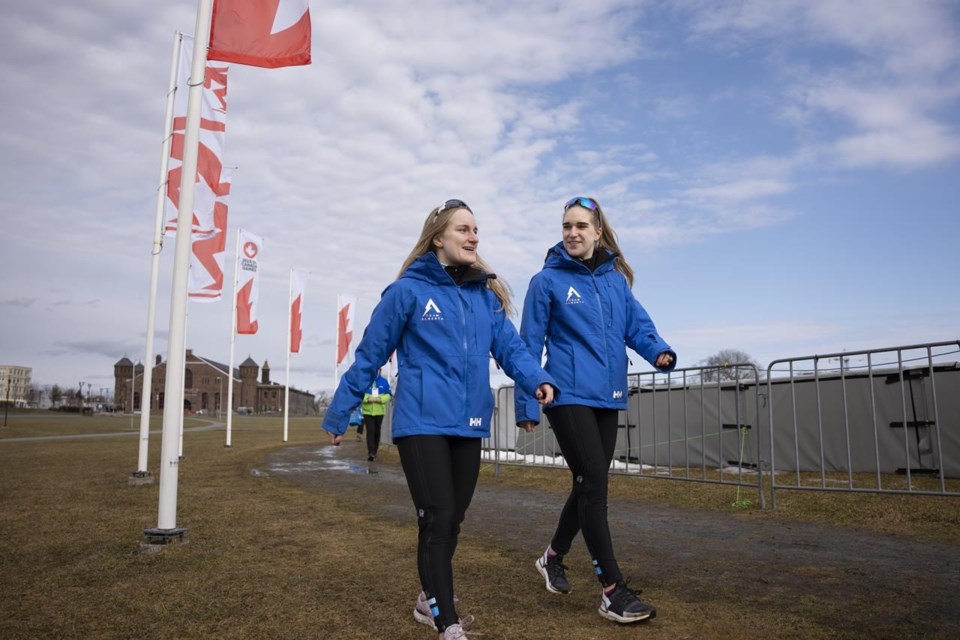HALIFAX — For some athletes at the Canada Winter Games, the discipline of elite sport has been part of their lives since they bounced on their parents' muscled legs.Â
And as the Games unfold in Prince Edward Island, Halifax and Crabbe Mountain, N.B., a glance through the Team Alberta roster provides examples of elite-sports parents who have nurtured talented offspring, with family ties found in hockey, curling and speedskating.
Stuart Wilson, a 30-year-old doctoral candidate in sport psychology at the University of Ottawa, says this mirrors a wider trend.
He studied data gathered in 2013-15 on Canadian and Australian athletes, and in 2017 published findings indicating that 46 — or about a third — of the 139 elite athletes interviewed had a parent who was either a national- or international-level competitor.
"It supports the old joke that if you want to be a great athlete, you have to choose your parents," he said, during an interview on Tuesday.Â
"But why does it happen? Well, we know there's a bit of genetics, but from a psychologist's perspective there's likely more things going on," he added.
For Zoe Lueders, 20, and her sister Maya Lueders, 17, of the Alberta speedskating team, the answer lies in emotional support and psychological guidance.
The daughters of Pierre Lueders, an Olympic gold medallist in bobsled, say they grew up with an expert source on the "mindset" needed for high-level competition.Â
"He taught me: be sure you don't overthink. The biggest thing is to trust in what you've done and in your ability," said Maya, who won silver in the 500 metres on Tuesday.
Luke Vlooswyk, a Calgary-based hockey player competing at the Games, has grown up with the role model of his 48-year-old mother, Lisa Vlooswyk, an eight-time Canadian long-drive golf champion.
He said he has watched and emulated her weight training technique at the family's home gym, learning to focus on form. "Whether it's the squats or dead lifts — she's given me helpful critique," the 16-year-old defenceman said.Â
He said his mother has passed on other tips. "She taught me to study your opponents' game while you're on the bench .... In hockey, I watch the forwards coming down the side constantly and I can pick up on what moves they're making," he said.
Then, there's the reality of learning from failing. "She's shown me that winning is great, but you learn more from your losses," he explained.Â
Wilson said it's his suspicion that having the support of an elite athlete as a parent may add an edge in the maze of choices amateurs face as they develop.
"Having a parent who's gone through that pathway could be an advantage on its own," he said.
"When do they start? How often do you go to practice? What is a good coach and a bad coach? A parent who has been there before has a much better idea of what good and bad is and how to support their children when they go through."
Yankun Zhao is the 19-year-old son of Xiuli Wang, who competed in four Olympics in speedskating for China and has been a national team speedskating coach for both Canada and China. Zhao has drawn on his mother to help navigate the hard times.
The young speedskater says that after his father died in the summer of 2021, he had difficulty training and fell short of being selected for the junior national team that year, but his mother offered guidance through a period of rebuilding.
"She took this defeat and taught me to use it as a motivation for the next year to make the junior (national) team a year later, which I did," he said, adding he came sixth in the 1 km race at recent world championships.
None of the athletes interviewed indicated a sense of heightened pressure from their parents, saying their mothers and fathers sometimes encouraged breaks at strategic times.
David Nedohin, a three-time world champion curler and the father of Canada Games curling athlete Alyssa Nedohin, said much of the benefit of an elite-athlete parent may happen on an almost subconscious level for their children.
"When you grow up in a house where the things you think about are goal-setting and how you're going to get there ... it's the children's natural way of thinking and how they approach life," he said in an interview Wednesday.
Wilson said that while sports dynasties are often celebrated, they can also suggest a Canadian sports system that lacks methods to bring in emerging talent from less privileged social groups. He said a wider, school-based sports system might allow more Canadian children to try different disciplines and encourage a more diverse talent pool.Â
"Winter sport is often pretty expensive and requires a lot of know-how,"," said the psychologist. "Because of institutional and financial barriers to participating and succeeding in some of these sports, it favours those who have been there before."
This report by The Canadian Press was first published Feb. 22, 2023.
Michael Tutton, The Canadian Press




